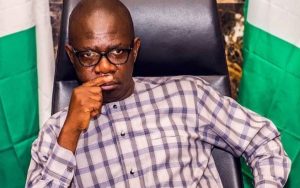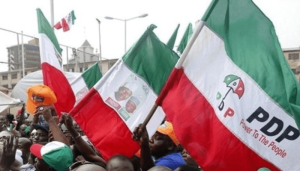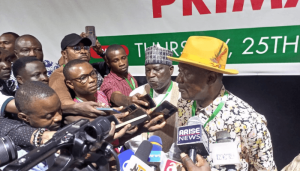State of economy seen driving voter turnout in 2023

With two recessions in six years, rising food prices, and unemployment that is one of the worst in the nation’s history, a large number of Nigerians trooping out to register and get their Permanent Voters Card (PVCs) in the ongoing Continuous Voter Registration (CVR) exercise is an indication of their determination to change the narrative in 2023.
A recent report by the National Bureau of Statistics (NBS) stated that the inflation rate had risen to 15.63 percent as of December 2021.
The NBS also, recently, reported that the annual food inflation rate rose for the 25th consecutive month to 20.75 percent in December from 20.71 percent in October last year, owing to further increases in the prices of basic food items.
According to Nigerian Methodology, the unemployment rate in Nigeria for January 2022 has also risen to over 33 percent.
The last seven years have been particularly challenging for many Nigerians. From insecurity to excruciating pain occasioned by poverty and job losses, the desire of many citizens is to have a breath of fresh air in 2023.
In the last six months since the Independent National Electoral Commission (INEC) CVR recommenced, a record from the agency indicates that more than 8 million Nigerians have registered so far.
The enthusiasm for the coming election could be seen in the widespread interest by the masses over the controversy surrounding the amended Electoral Act, particularly the area that concerns the electronic transmission of results.
In recent times, Nigeria’s elections have been marred by voter apathy; stakeholders say that the situation has undermined the credibility of these elections and also dented the legitimacy of elected public office holders.
In the 2019 general election, only 35 percent of Nigerians voted. Out of a voting-age population of 106.4 million, only 82 million Nigerians registered to vote, and only 28 million of those registered voters eventually voted.
Incumbent President Muhammadu Buhari was elected by 15 million voters, while his closest rival Atiku Abubakar scored 11.3 million votes.
Some political watchers believe that the failure of government at all levels and the socio-economic challenges bedevilling the country have contributed to the problem of voter apathy.
Nigerians are getting poorer daily; one square meal is difficult; quality education and healthcare seem to be out of their reach.
Thus, ahead of the 2023 general election, there appears a renewed vigour among the electorate to elect a purposeful and focused leader that would reposition the country.
Observers have, however, expressed the optimism that with the amended Electoral Act there would be a reduction in voter apathy.
“Nigerians are suffering; of course, Nigerians have seen a lot over the last six and half years, unemployment and poverty have multiplied. People are eager to make the change. Though they lack confidence now because they think their votes may not count.
“I think things would change with the amended Electoral Act. Nigerians’ vote would count. During elections you see youths playing football on the road because they don’t believe in the system,” Sanni Yabagi, national chairman of the Action Democratic Party, said.
Speaking with BusinessDay on the expectations of Nigerians as the election draws nearer, Olisa Agbakoba, a senior advocate of Nigeria, said: “What we want to hear from the aspirants is about what they would say about security; about fighting corruption and what tools that they would recommend; because it is from the programme of the political presidential candidate that you have an expectation.”
Read also: 2023: INEC resumes online voter registration
Bukola Aderemi, an ex-banker and hopeful political aspirant for Ogun State House of Assembly, said the country had been having bad leaders because the electorates had failed to defend their votes and also to make them count.
“I was unhappy when an unpopular candidate emerged the winner at the primaries and went ahead to win the Federal Constituency seat in my state in 2015, same repeated in a by-election. It happened because the voters sold out, and if they did not, why didn’t they defend their votes at the pools,” she asked.
Speaking further, she noted that sustained agitations or standing up to intimidations by security agents during polls, will always secure the votes, but the reserves is usually the case because many fear for their lives.
“Look at how Edo people stood their ground to save the state from the grip of Oshiomhole; Anambra resisted the Federal Government; Bayelsa also did the same. We can insist on who we want, reject their money, stand up to security agents and go for a candidate that can deliver. This will make people join any party because it will no longer be the party but the credibility of the candidate that will win the election. With the enthusiasm that I am seeing now, Nigerians are determined to make a statement in 2023,” she said.
Political analyst, Kunle Okunla said it was obvious the nation’s economy had been mismanaged since 2015, since the administration lacked a clear economic direction, adding that the state of the economy would influence the voting decisions of some Nigerians.
According to Okunla, “It is obvious the economy is in bad shape; I can’t see what the President is trying to do or his direction. Nigerians are now poorer; check the unemployment rate; people would want to make that change with their votes in 2023.
“The poor state of the economy is why you see vote-buying becoming frequent now, and you would see more of that next year. However, voters would react to the electoral process in different ways depending on how they perceive the implications of the economic policies of the governing party.
“I don’t foresee high voter apathy, but it is certain that the state of the economy would definitely influence their voting behaviour in different ways,” he said.









